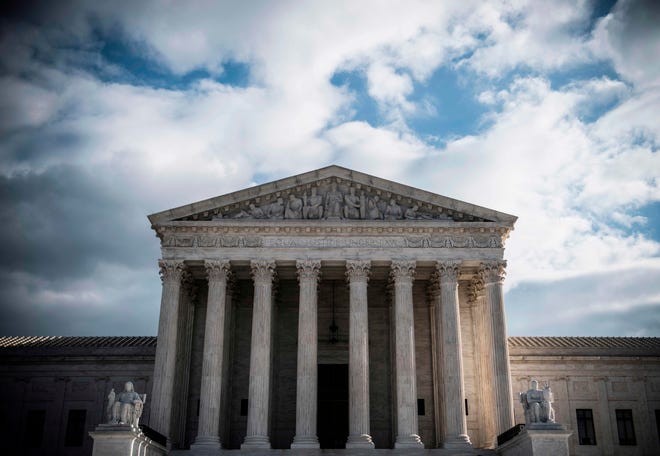
WASHINGTON – The Supreme Court batted aside a pair of cases Monday that raised questions about former President Donald Trump’s business ties, finding the concerns over whether he violated the Constitution's anti-corruption clauses moot.
The cases involved questions about whether Trump violated the emoluments clauses of the Constitution by benefiting from his properties – notably, a hotel in downtown Washington, D.C. – where foreign and other entities with business before the federal government often stayed.
Trump’s critics argued that receiving revenue from those properties violated that prohibition.
The justices on Monday sent the cases back to lower courts and ordered that they be dismissed. Trump left office on Jan. 20, the day President Joe Biden was inaugurated.
More:Trump's profits from private businesses to get hard look from appeals courts
"This important litigation made the American people aware for four years of the pervasive corruption that came from a president maintaining a global business and taking benefits and payments from foreign and domestic governments," said Noah Bookbinder with Citizens for Responsibility and Ethics in Washington, a watchdog group that brought one of the cases. "Only Trump losing the presidency and leaving office ended these corrupt constitutional violations stopped these groundbreaking lawsuits."
The Justice Department did not immediately respond to a request for comment.
Aiming to limit the potential for outside influence on the president, the Constitution’s Framers included language asserting that “no person holding any office of profit or trust under [the United States], shall, without the consent of the Congress, accept of any present, emolument, office, or title, of any kind whatever, from any king, prince, or foreign state.” A second constitutional provision specifically prohibits the president from receiving domestic emoluments.
The challenge with the cases – one brought by competitors to Trump properties and the other by the state of Maryland and Washington, D.C. – focused largely on who had standing to sue the president over the alleged violation of the clauses.

Democratic lawmakers and government watchdogs argued the most flagrant violations happened when government officials – including some from foreign governments – spend lavishly at the Trump International Hotel a few blocks from the White House.
Justice Department attorneys had countered that a violation of the clauses only happens if Trump profits directly from his employment as president, not from "the proceeds of ordinary commercial transactions between foreign governments and businesses."
The dismissals drew criticism from some who noted Trump continues to flirt with running again for president in 2024.
“If ever there were cases that fit the mootness exception these are they,” tweeted Sherrilyn Ifill, president of the NAACP Legal Defense and Educational Fund. “The fact they arrived at the SCOTUS at the end of Trump’s term demonstrate precisely why these actions can easily ‘evade review.’”
Contributing: Rich Wolf
Source link









